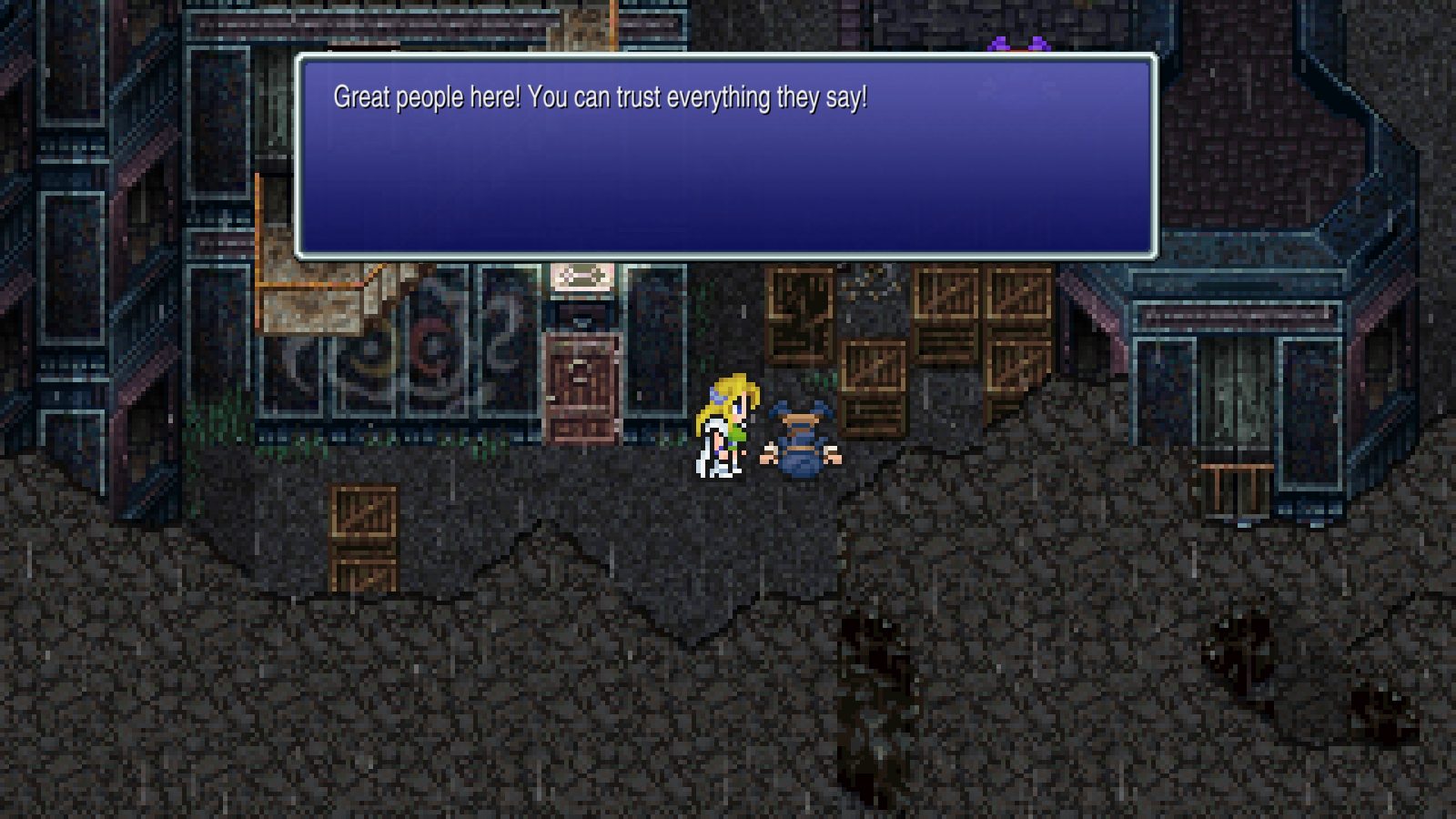The War of the Magi devastated the world long ago. As a result, the race of Espers, beings who controlled a forgotten force called Magic, exiled themselves to end the conflict and escape humans who would harness their powers for evil ends. One thousand years have passed since then, and the Gestahlian Empire has rediscovered magic and fused it with technology, creating Magitek warmachines in an effort to conquer the globe. Terra, a young, unwilling soldier for the empire, leads an attack on Narshe, a village where an ancient Esper was discovered frozen. In the ensuing encounter, the slave crown keeping her enthraled is shattered, returning her free will but taking her memories. Lost in a strange land with mysterious powers, she joins up with the Returners to fight the empire, make up for the atrocities she committed while under their rule, and discover her past.
Final Fantasy VI marked a turning point for the series towards more story and character focused games. FFIV was the first to do this, but FFV stepped back a bit for a more lighthearted, gameplay focused experience. Pretty much every numbered entry is good in their own right, but VI and VII constantly compete for the title of “Best Final Fantasy” for a reason – they’re both great games with interesting stories and lovable characters. FFVII is currently undergoing the big, flashy remake treatment, but VI is the last in the string of Pixel Remasters from Square Enix and it might just be the best one yet.
If you’re not familiar with the Pixel Remasters, here’s a bit of a recap. While most of the numbered Final Fantasy games have been available on modern devices for quite some time, the actual quality of those versions was… well, they were pretty bad. They replaced the original pixel art with some truly garish and lifeless drawings and “optimized” the interface for mobile with big, clunky menus that were much harder to navigate even on their intended platform. After years of fan complaints, Square Enix finally decided to remedy the problem by recreating that original pixel style and design – after all, if it ain’t broke don’t fix it. There have been a few changes, such as removing some shading on character sprites, widescreen support, a music player with fully orchestrated soundtracks, and an art gallery as well as a completely redone translation, but overall these are the games you know and love in a shiny new package. Despite some issues like the terrible, terrible font choice, some UI inconsistencies, lack of added content from the GBA versions, and the aforementioned loss of shading, these are excellent versions of each game. Those issues do remain in VI, with the loss of that game’s GBA content being especially missed, but there is a bit more done here to put it above the rest of the collection.
As for the game itself, Final Fantasy VI eschewed the job system of V, instead taking the idea of that system and spreading it across its ensemble cast. Locke, who you meet early on, is a thief and has the ability to steal, while the martial artist Sabin can use powerful techniques by inputting different button commands called Blitz. While Terra and Celes do start out with magic, any character can learn any spell by equipping the associated Esper allowing you to further customize each character to your liking. While you may be tempted to pick four characters and stick with them the entire adventure, you’ll often be required to split the larger party into several smaller teams and even lose access to certain characters after story events. It’s a fun system to experiment with especially since you can’t really screw up, you never lose out on anything since every character can learn almost every spell. This does mean you have to use characters you don’t really like or don’t mesh well with your playstyle, like Gau’s blue mage copy attacks, but you can usually cover your weaknesses in those situations.
While the game is freeform from a systems perspective, the first half of the story is pretty linear. You don’t even gain access to espers until about five hours in, but the second half is almost entirely player driven exploration to make up for this. I don’t have an issue with the linearity of the beginning hours, since it allows you to learn the main cast’s abilities and establishes their characters, but it might be a little slow for some people.
Speaking of characters, in my opinion these are some of the most likable and relatable in the franchise. Locke and Celes falling in love feels genuine, and the latter’s struggle with suicide is one of the most relatable portarals in video games. Heck, Terra is still my favorite FF protagonist (not counting XIV’s Warrior of Light) even if by design alone. One of the most memorable moments in the story is the Opera Scene, which really shines in this remaster.

While the majority of the game uses bright, 2D environments and pixel art, the opera looks more like the HD 2D games such as Octopath Traveler and the upcoming Triangle Strategy. Certain segments like the dance and bouquet throw have been made easier to get right too, leaving you to enjoy the atmosphere, music, and new vocals. While I kind of wish the whole game was presented in this style with a bit more visual flair to it, you do get to enjoy the best of both worlds here.
In line with the rest of the remaster series, the game looks and sounds fantastic. Although, I have to bring up the font again because it’s just that bad. I showed the opera scene to a friend who hasn’t played the game since the original, and they really liked the changes but complained about how squished the text looked. You can switch this out by digging around in the game’s files, but you really shouldn’t have to do that.




















